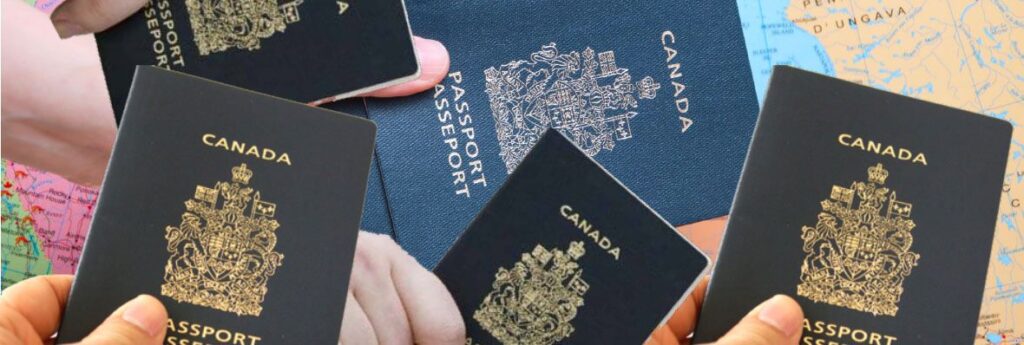Canadians can claim the world’s 8th-most valuable passport for the third year running, according to the respected Henley Passport Index, which ranks the world’s 199 passports according to the number of destinations their holders can access without a prior visa. Japan took top spot for the fifth consecutive year.
Canada has ranked 8th since 2021, having edged up one spot that year. Before that, Canada was sixth four years in a row. Historically, the document has never ranked lower than 9th and hit its high point – 2nd – in 2014. In 2023, Canadians can enter 185 countries visa-free.
Rankings are based are data from IATA.
Japanese citizens, meanwhile, can now visit 193 destinations out of 227 visa-free, while those of South Korea and Singapore, which are tied in 2nd place, enjoy a visa-free/visa-on-arrival score of 192. Germany and Spain are joint 3rd, with visa-free access to 190 destinations worldwide. The UK and the US remain in 6th and 7th places, with scores of 187 and 186, respectively, and appear increasingly unlikely to regain the top spot they jointly held nearly a decade ago.
Afghanistan remains firmly at the bottom of the Henley Passport Index with a score of just 27 – 166 fewer visa-free destinations than Japan – the widest global mobility gap in the index’s 18-year history.
Chairman of Henley & Partners, Dr. Christian H. Kaelin, says the firm’s latest research into the link between visa-free travel and global economic access unpacks what passport power means in concrete financial terms.
“For global citizens, a better measure of economic mobility and fiscal opportunity afforded by their passports is to look at the percentage share of global GDP accessible to them visa-free,” he says. “Our latest research into how much global economic access each passport provides is a useful tool for investors and gives new insight into the ever-widening inequality and wealth disparity that defines our world.”
On a macro level, the new study reveals that just 6% of passports worldwide give their holders visa-free access to more than 70% of the global economy. And only 17% of countries give their passport holders visa-free access to more than four-fifths of the world’s 227 destinations.
The Japanese passport gives visa-free access to 85% of the world and, collectively, these countries account for a whopping 98% of the global economy (Japan’s own GDP contribution is around 5%). In contrast, the Nigerian passport at the lower end of the index provides visa-free access to only 46 destinations (20% of the world), which account for just 1.5% of global GDP. The lowest ranked Afghanistan passport provides visa-free access to just 12% of the world and less than 1% of global economic output.
Prof. Trevor Williams, former chief economist at Lloyd’s Bank Commercial Banking, says the research proves the causal relationship between the ability to travel, foreign investment in a country, increased trade, and economic growth. “These links are mutually reinforcing and agglomerative. Skills and talent go where there is the ability to work, invest, and travel, attracting others wishing to do the same and creating a positive loop.”
The war in Ukraine
The Ukraine war is yet to have a significant impact on the Henley Passport Index scores of Russia and Ukraine, with both countries retaining roughly the same position ‘on paper’ since the invasion nearly a year ago. Russia is currently ranked 49th with a score of 118, while Ukraine sits 13 places above, ranking 36th with a score of 144. However, due to airspace closures and sanctions, Russian citizens are effectively barred from traveling throughout most of the developed world, with the marked exceptions of the UAE and Türkiye, which have become focal points.
Ukrainians, on the other hand, have been granted the right to live and work in the EU for up to three years under an emergency plan in response to what has become Europe’s biggest refugee crisis this century. Already one of the biggest climbers on the Henley Passport Index, moving up 24 places over the past decade, Ukraine would likely break into the Top 10 most powerful passports in the world if it were to join the EU. Negotiations for membership are due to begin in earnest in the next few months after the EU approved Ukraine’s application for EU candidate status in record time last June.
Trends
While Asian countries still dominate the very top of the index, the growing passport strength of Gulf states has been identified as a key trend in the coming year. The UAE has climbed an astonishing 49 places over the past 10 years. Ranking 64th in 2013, with a visa-free score of just 72, the UAE now sits in 15th place, with a score of 178 and access to nearly 70% of global GDP. Analysts anticipate that Kuwait and Qatar will sign a visa-free deal with the EU this year – a move that will dramatically enhance their Henley Passport Index scores.

